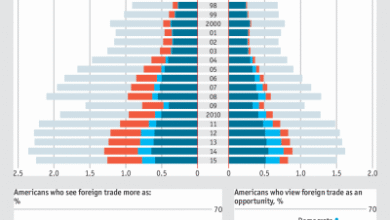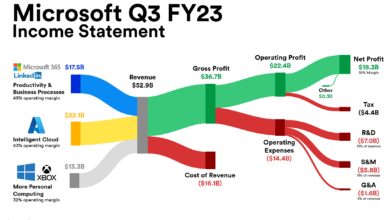Oversold Stocks: Potential for a Technical Bounce Ahead
In the stock market, identifying oversold stocks is crucial for investors seeking opportunities for a profitable turnaround. Following a challenging week characterized by economic uncertainty, many equities show signs of being oversold, signaling a potential technical bounce. Utilizing tools like a stock screener can help pinpoint these opportunities, especially those with a 14-day Relative Strength Index (RSI) below 30. For example, consumer stocks such as Costco and Target are among those with favorable conditions for a market rebound, indicating they could be undervalued at present. Such oversold conditions not only offer a glimpse into potential gains but also highlight the resilience of market dynamics amidst broader volatility.
The concept of undervalued stocks, often identified as oversold equities, plays a significant role in investment strategies. When stocks experience price declines beyond their intrinsic value, they enter a phase where they are deemed ripe for recovery. Tools such as a stock screener can aid investors in finding these opportunities, particularly those with a notably low 14-day RSI that suggests they are positioned for a strong rebound. In the current market climate, various consumer brands are showing these signs, making them attractive candidates for savvy investors. Understanding the indicators of such investments is key to navigating and capitalizing on market fluctuations.
Understanding Oversold Stocks
Oversold stocks represent a critical concept in the world of trading and investment. These stocks typically show a declining trend in price, often due to market overreactions to short-term news, earnings reports, or economic conditions. When a stock is deemed oversold, it frequently indicates an attractive buying opportunity, especially for investors looking for discounted assets. Utilizing tools such as a stock screener can help investors identify these opportunities based on specific indicators, such as the 14-day Relative Strength Index (RSI). A stock with an RSI below 30 suggests a strong potential for a rebound, creating a holistic approach for capturing gains in a volatile market.
Moreover, understanding the context in which a stock becomes oversold is essential. Often, external factors such as economic downturns or geopolitical tensions can lead to irrational sell-offs. These phenomena can manifest in consumer stocks, which may suffer disproportionately during uncertain economic conditions. Recognizing that such dips may not reflect the underlying strength of the company can empower investors to strategize effectively. Identifying sectors poised for a market rebound, including consumer stocks, can help further refine investment choices.
Identifying Technical Bounces in Oversold Stocks
A technical bounce refers to a short-term price movement where an oversold stock begins to rise after a period of decline, often triggered by formatting positive sentiment among investors and traders. In the current market context, several stocks have recently shown signs of a technical bounce, particularly those flagged as oversold. For instance, stocks like Target and Costco have RSI readings indicating they are trading below their intrinsic value, suggesting potential for a resurgence. Investors using detailed analysis through stock screeners can effectively pinpoint such stocks as part of their trading strategy.
Investors should pay close attention to the indicators supporting a potential technical bounce. For example, if a stock’s price shows a considerable dip, followed by increases in trading volume and positive moving averages, these factors can signal a reversal trend. Monitoring consumer stocks can also be indicative of market dynamics, as these companies often reflect broader economic sentiments. The upcoming quarter might reveal whether Target, Costco, or other firms on this oversold list can capitalize on any shifts towards a declining bear market, presenting opportunities for keen-eyed investors.
The Role of 14-Day RSI in Stock Analysis
The 14-day Relative Strength Index (RSI) is a widely-used momentum oscillator that measures the speed and change of price movements, indicating whether a stock is overbought or oversold. An RSI reading below 30 generally denotes oversold conditions, making stocks prime candidates for a potential bounce-back. Investors actively employ this metric to evaluate potential rebounds, especially following bearish trends. The recent analysis that placed stocks like Deckers and Target on the oversold list prominently highlights how critical the 14-day RSI is in stock analysis.
By integrating the 14-day RSI with other analytical tools, investors can draw a comprehensive picture of a stock’s health and viability. For instance, Deckers Outdoor’s recent RSI of 21.6 illustrates a condition ideal for contrarian investments, as analysts predict significant upward movement in the coming weeks. Furthermore, using this metric allows traders to establish a disciplined approach to timing their entry, enhancing their chances of turning market conditions into profitable outcomes.
Market Rebounds and Consumer Stocks
Market rebounds occur when stock prices begin to recover following a period of decline, driven by various factors, including improved economic data, positive corporate earnings, and restorative investor sentiment. Consumer stocks are often particularly sensitive to these rebounds, as they reflect the health of the economy and consumer spending habits. In light of the current economic landscape, investing in consumer sectors that are oversold presents an enticing opportunity for capitalizing on market rebounds.
Currently, the landscape appears ripe for a rebound, especially for stocks such as Costco which is still facing recovery from a recent earnings miss. As consumer financial confidence begins to stabilize post-recession, many analysts foresee a resurgence in profits for these firms. The anticipation surrounding upcoming earnings results will be critical in determining the strength and sustainability of a market rebound, particularly for consumer stocks that are often quick to reflect shifts in consumer behavior.
Strategies for Investing in Oversold Stocks
Investing in oversold stocks requires a clear strategy that incorporates a detailed analysis of both the current market trends and the fundamentals of the companies involved. Investors should utilize stock screeners to identify stocks with strong fundamentals and oversold characteristics, ensuring they are not merely buying into a downward trend but recognizing the potential for recovery. Moreover, applying technical analysis, including 14-day RSI and volume indicators, is crucial in shaping informed decisions on entry points.
Additionally, investors should consider diversification across various sectors, even within the realm of oversold stocks. While consumer stocks exhibit potential for a strong rebound, diversifying into other oversold sectors can mitigate risks associated with market volatility. By maintaining a balanced portfolio, investors can increase their chances of capturing gains not only from rebounds but also from stocks that stabilize during market corrections.
Utilizing Stock Screeners Effectively
Stock screeners are invaluable tools for investors looking to identify investment opportunities based on specific criteria, such as low RSI readings or recent price declines. By filtering through vast amounts of data, investors can quickly pinpoint stocks that are classified as oversold and evaluate their recovery potential. When deployed effectively, stock screeners can uncover hidden gems, enabling investors to make more strategic decisions amidst market uncertainty.
A well-rounded stock screener can incorporate various indicators, such as price patterns, earnings reports, and macroeconomic data, ensuring that investors have a holistic view of the market landscape. By consistently using these tools, even novice investors can enhance their market acumen, leading to more profitable outcomes. As the market continues to experience fluctuations, keeping a keen eye on oversold stocks via advanced screening techniques will be crucial for navigating the upcoming volatility.
Positive Sentiment and Stock Recoveries
Positive sentiment in the market plays a pivotal role in driving stock recoveries, especially for those categorized as oversold. When investor confidence begins to rise, stocks that are trading at lower prices can quickly rebound as buying interest increases. This alignment between market perceptions and actual performance is essential for stocks facing challenging circumstances, such as the recent struggles experienced by major consumer retailers like Target and Costco.
Building positive sentiment often requires a blend of improved earnings forecasts, positive market news, and shifts in economic stability. As consumer stocks begin to exhibit signs of recovery, analysts and experts will likely ratchet up their recommendations, which can trigger buying momentum. Investors should remain vigilant for indicators of sentiment shifts, keeping abreast of market news that could signal such changes and leading to potential investment opportunities among oversold stocks.
Analyzing Analyst Recommendations
Analyst recommendations can significantly influence investor behavior surrounding oversold stocks. Positive ratings from analysts can lead to increased interest in a stock, propelling its price upward as more investors begin to buy in. For instance, the bullish consensus surrounding Costco, despite its recent struggles, indicates that many believe the stock can recover substantially. By understanding these analyst projections, investors can make more informed decisions and time their investments effectively.
Moreover, reviewing the reasoning behind analyst upgrades or downgrades provides context for the current market conditions. In the case of heavily oversold stocks, discerning reasons such as reduced sales forecasts or broader economic worries can offer deeper insight into the potential risks and rewards of investing in these stocks. Keeping abreast of analyst expectations allows investors to act swiftly and capitalize on market movements aligned with emerging insights.
Frequently Asked Questions
What are oversold stocks and how can they indicate a potential technical bounce?
Oversold stocks are those that have been sold off to the point where their prices are deemed undervalued, typically reflected by a 14-day RSI below 30. This condition often signals a potential technical bounce, suggesting that the stock may be due for a rebound due to market corrections or restoration of balance.
How can a stock screener help identify oversold stocks?
A stock screener is a powerful tool that filters stocks based on specific criteria, such as the 14-day RSI. By utilizing a stock screener, investors can effectively pinpoint oversold stocks that are candidates for a market rebound, potentially paving the way for profitable trades.
What does a 14-day RSI below 30 mean for oversold stocks?
A 14-day RSI below 30 indicates that a stock is oversold, suggesting that it may be undervalued and poised for upward movement. This technical analysis metric is commonly used by traders to identify stocks that could experience a technical bounce in the wake of a decline.
Are there recent examples of oversold consumer stocks that might rebound?
Yes, recent examples of oversold consumer stocks include Target and Costco, which have shown low 14-day RSI readings, indicating they are oversold. Analysts predict that both stocks could see significant rebounds based on their respective consensus price targets.
What role does market sentiment play in the performance of oversold stocks?
Market sentiment significantly influences the performance of oversold stocks. Fear of recession or external economic pressures can lead to drastic sell-offs. However, once the market sentiment shifts, these oversold stocks may experience a rebound as investors realize their potential value.
How can investors benefit from trading oversold stocks during a market rebound?
Investors can benefit from trading oversold stocks during a market rebound by buying when prices are low and selling when they recover. Identifying these stocks using a stock screener and understanding the 14-day RSI can lead to strategic investments that capitalize on the anticipated technical bounce.
What strategies should investors consider for trading oversold stocks?
Investors should consider strategies such as setting target price limits based on consensus forecasts, monitoring 14-day RSI levels for signals of recovery, and maintaining a diversified portfolio to manage risk while trading oversold stocks.
Can oversold stocks indicate sector trends, especially in consumer markets?
Yes, oversold stocks can indicate broader sector trends, particularly in consumer markets. The performance of consumer stocks like Costco and Target can reflect changing consumer behavior and market conditions, serving as indicators for potential recoveries or declines in the market.
| Company | 14-Day RSI | Weekly Change (%) | Monthly Change (%) | Analyst Target Upside (%) |
|---|---|---|---|---|
| Target | 19.13 | -0.6 | -16.0 | 32.0 |
| Costco | 28.9 | +0.6 | -13.0 | 19.0 |
| Deckers Outdoor | 21.6 | -0.7 | -15.0 | 85.0 |
Summary
Oversold stocks, like Target, Costco, and Deckers Outdoor, are showing signs of potential recoveries after a challenging period for the market. With RSI levels indicating oversold conditions, these stocks may experience rebounds as analysts remain optimistic about their value. The mix of external pressures such as recession fears and tariff uncertainties continues to impact stock performance, but these companies present intriguing opportunities for investors looking to capitalize on potential price corrections.




